The Winnipeg Jets have been equal parts exciting and infuriating to watch through their first eight games, looking at times like a contender and other times like a draft-lottery shoo-in. They’ve had impressive performances, such as their all-around excellent win against the Minnesota Wild in their home opener, and awful ones, such as their stinker against the Islanders.
Related: Jets Weekly: Laine, Heinola, Wheeler, and More
Their rollercoaster tendencies have been from game-to-game, but also from period to period, especially over the first two games of their current five-game homestand. Unfortunately, their bad stretches within those pair of contests have outweighed the good and led to back-to-back losses.
Who Are the 2019-20 Winnipeg Jets?
With a ton of turnover during a trying offseason, the Jets are still very much trying to determine exactly what type of team they are in 2019-20. Captain Blake Wheeler was honest about that post-game Tuesday, saying they were still trying to figure out their identity and that they were a work in progress.
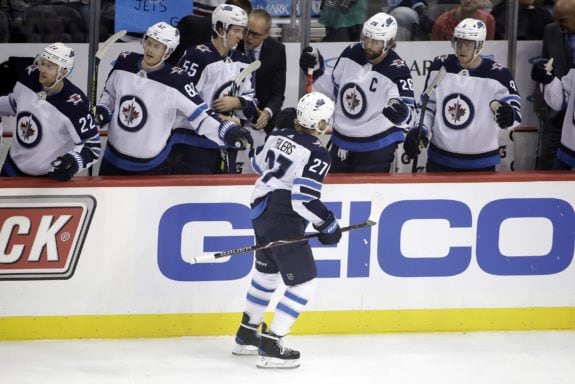
Wheeler offered some insights as to the type of team he’d like them to be — one that’s good defensively and is confident of their ability to produce offence. It’s clear the latter will be easier to attain than the former, and it’s also clear they haven’t found the chemistry needed to put together consistent 60-minute efforts yet.
Bad Stretches Within Games Have Cost Jets Lately
There were a couple of stretches during the Jets’ Sunday tilt versus the Pittsburgh Penguins where the team deflated in the face of adversity and could not bounce back.
Coming off a spirited 3-2 comeback victory in Chicago the night before, the Jets scored the game’s opening goal for the first time all season against Sidney Crosby’s squad and found themselves deadlocked 1-1 in the second period.
However, it all went south after the Penguins scored a couple of greasy goals; the first when Jake Guentzel scored on a power-play double tip, and the second when Sam Lafferty snagged a friendly carom off the backboards and stuffed it past Laurent Brossoit’s skate from behind the goal line just 41 seconds later.
The Jets looked demoralized thereafter — they had another bad stretch in the third where a combination of bad bounces and suspect defensive-zone positioning led to three more goals in less than six minutes — and left a 7-2 loser.
The Jets had a similarly bad stretch that killed their chance to win in their most recent game against the Arizona Coyotes.
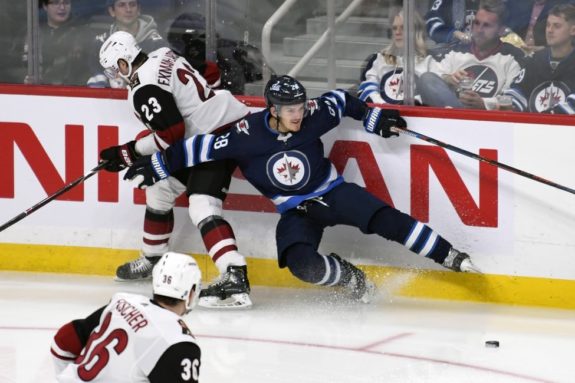
Once again, the Jets scored the first goal and played reasonably well in the first period, but allowing the equalizer with seven seconds left seemed to discourage the squad.
A pair of penalties in the second caused the Jets to go from all tied up to down two goals in a 2:10 span. 14 seconds after Christian Dvorak’s go-ahead power-play goal, Mark Scheifele took a slashing penalty that put the Jets right back on the kill; a kill that ended when Nick Schmaltz flung one past Connor Hellebuyck.
The Jets finally found a way to combat the Coyote forecheck in the third period and pushed back – firing 16 shots on Darcy Kuemper and converting on one of three pretty crisp power-play chances – but the hole they dug for themselves in the was ultimately too deep to climb out of.
Even in wins, the Jets have played in spurts. They had an anemic first 20 in the win against the Blackhawks, and really only showed up for the third of their improbable comeback against the New Jersey Devils back on Oct. 5.
Homestand Presents Jets Chance to Gel
The Jet have been one of the busiest teams so far this season; even with Wednesday off, they’re still tied for the league lead with eight games played.
That means they haven’t had a lot of time to practice, which isn’t ideal for a team that entered the season full of uncertainty and with a patchwork blue line.
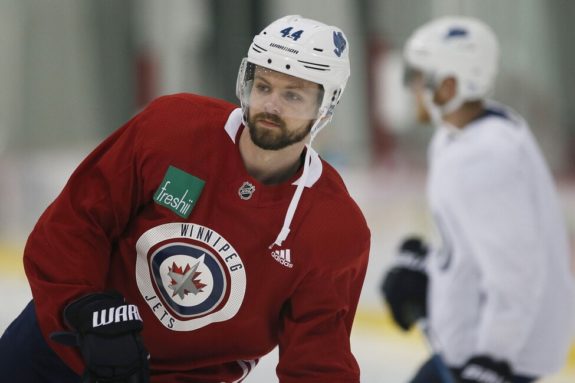
In a Free Press article earlier this month, sportswriter Mike McIntyre noted that teams aren’t practicing as often as they did decades ago as the game has evolved.
The Jets are eschewing some morning skates — which players in the past “sometimes needed… to shake off the cobwebs” since they weren’t in good shape — in favour of more video sessions and meetings. (from ‘We’re talking about practice, man,’ Winnipeg Free Press, 10/04/19.)
However, with eight players on the roster who didn’t play for the Jets a season ago, it’s clear they need to work on their X’s and O’s and need more opportunities to try and build chemistry and familiarity. The homestand will present a chance to do both.
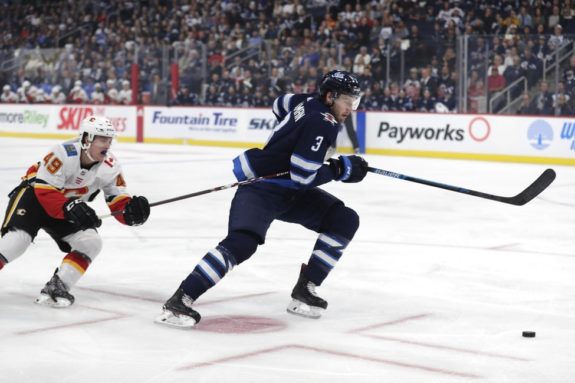
They’re in Winnipeg for another week, with games against New York Islanders tonight, the Edmonton Oilers Saturday, and the Los Angeles Kings. After that, they’ll head to Regina to face the Calgary Flames in the 2019 Heritage Classic next Saturday.
Related: 5 Must-See Jets Games in 2019-20
They’ll have plenty to work on, especially their penalty kill, which head coach Paul Maurice was critical of Tuesday.
“We just didn’t kill two penalties. That, for me, is the big one,” he said of the units that have operated at just 60 percent efficiency so far. “Those were their first two (power play) goals of the year. We made mistakes… I mean, we blocked four shots tonight. Four… and that’s a problem when you’re penalty killing. You gotta get in the lane.”
Temper Your Expectations
Don’t expect — even though the Jets will practice more in the next week — them to suddenly morph into the picture of consistency, especially on defence, Maurice cautioned.
“Our back end looks a whole lot different. We’re going to have to identify and become a team that plays a five-man defensive game,” Maurice said. “(Shoring up the blue line) will be a work in progress all year. That’s not getting a switch flipped next week and now we’re a defensive juggernaut. We’re going to have to work really, really hard to be a solid defensive team.”
Paul Maurice on the Jets’ defence
The Jets still have many weapons up front — one of the things fans can be thankful for — and have already turned in some fine performances, but the consistency just isn’t there yet.
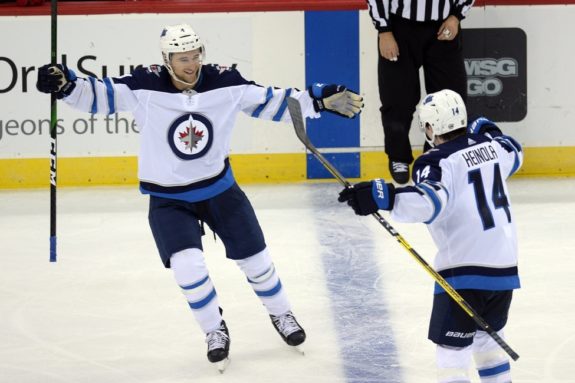
In the meantime, Jets fans would be best served to insulate themselves from disappointment by tempering their expectations, enjoying when their team gives an earnest 60-minute effort but not being surprised when it unravels for stretches.